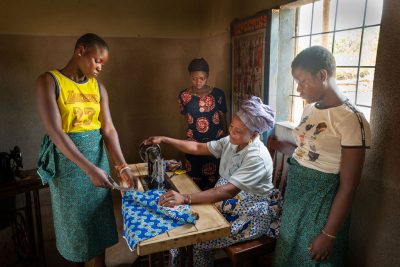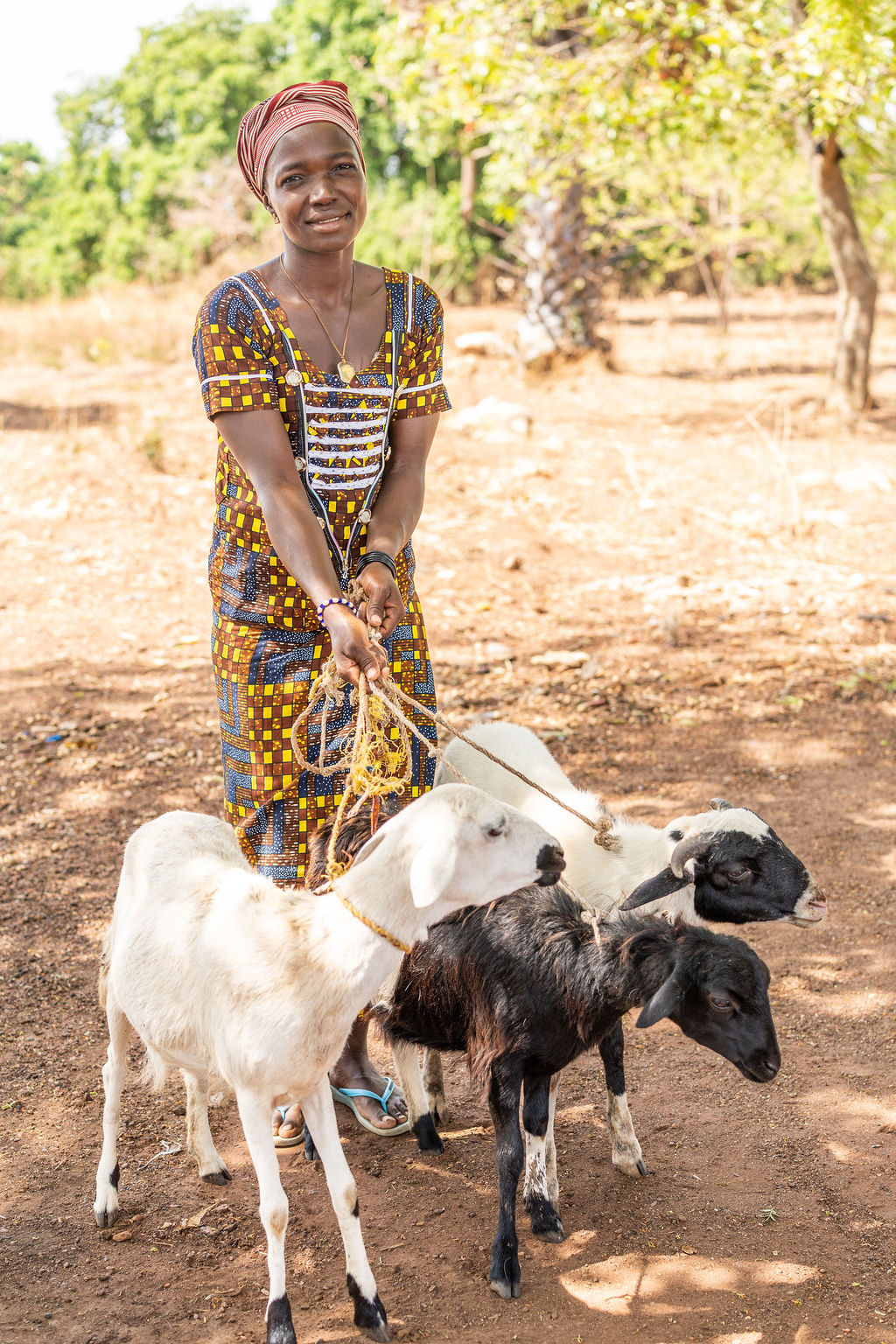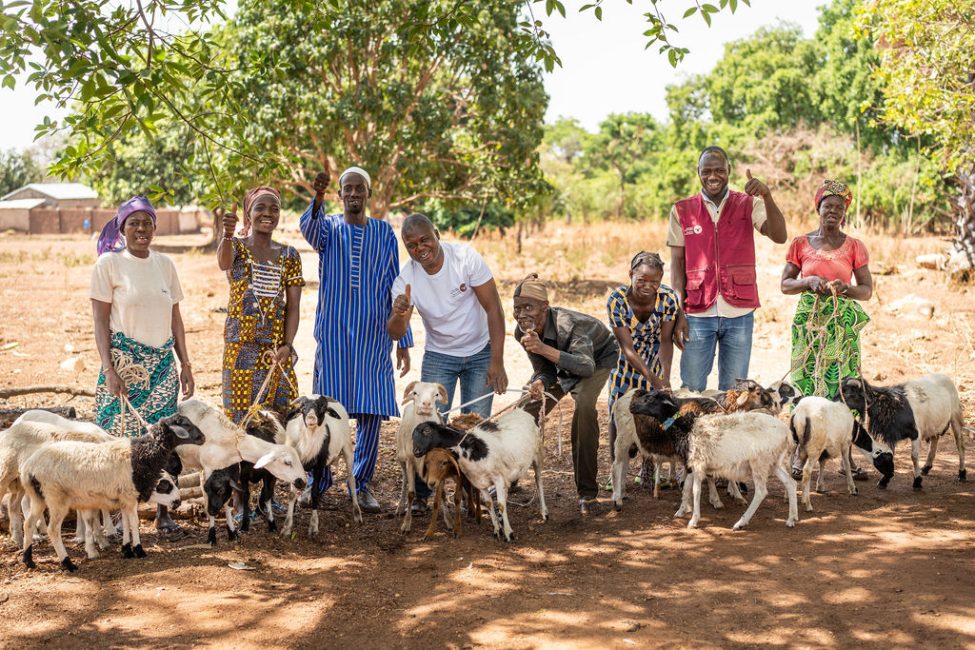In the remote village of Wansoukou, in northern Benin, women dance and sing. Their smiles radiate joy and serenity. Today is a special day: solidarity takes center stage with the first redistribution of young sheep. Eighteen months earlier, about ten people had been selected to receive three sheep, with the sole condition of later passing on their first lambs. This support marks a new milestone for solidarity-based livestock farming in Benin.
On the village square, in the shade of trees, all the villagers gather, dressed in their colorful pagnes, listening attentively to the explanation of how the redistribution will unfold. The first beneficiaries arrive with their young sheep. The redistribution is organized by drawing lots for the new pairs. It is also an opportunity for these first beneficiaries to speak up. They share their experiences and offer advice to their neighbors. One of them, Clarisse, is completely at ease and even adds a touch of humor to her story.
Clarisse, a woman with a talent for sharing knowledge

Clarisse in her sewing workshop, where she trains young women and passes on her knowledge. © Loïc Delvaulx
Clarisse is a widow and mother of five. She exudes quiet strength and has a contagious smile. She recalls the turning point this support represented:
“The arrival of the sheep was a real springboard for managing my household,” she says.
Clarisse learned to sew with the sisters in her village and opened her own workshop eight years ago. Today, with several sewing machines, she trains around twenty young girls. Yet she admits, with some disappointment:
“My workshop doesn’t bring in enough for me to live without livestock farming. Orders are irregular and the income is insufficient. Livestock farming remains my main source of income.”
Tangible changes thanks to solidarity-based livestock farming in Benin
With emotion, she explains the concrete changes this has brought to her family:
“What has changed for me with the arrival of the sheep is the money I earn. Thanks to this, I was able to send all my children to private school. I even earn enough for my eldest daughter, who is 15, to attend secondary school in Natitingou. Without the sheep, she would have had to start working to help me. Now I can pay for school fees and materials without worry, and I am proud of that.”
But she does not forget the daily reality, which remains difficult despite this progress:
“Here we are poor, life is hard. We don’t have enough to eat properly. If we need money for the children’s healthcare, we must sell our animals—and then we lose our source of income.”
Clarisse also highlights the strength of the group she and the other beneficiaries have built:
“Since we received the animals, we share advice and meet regularly as a community. This has created strong bonds. We have become an important group that the village turns to when decisions need to be made. Take the maize field next to my house: last year we collectively decided to cultivate it. We share the work in the field as well as the harvest.”
Noya: preparing the future and passing it on

Noya receives three sheep: a new start for her family and an investment in the future. © Loïc Delvaulx
Among the new beneficiaries is Noya, who has just received three sheep. At 35, and as a mother of eight children, she is driven by a clear determination: to feed her family and offer her children a better future. In her eyes, the sheep already belong to her children. They are living wealth that they will later be able to build upon.
She had been waiting for this moment for a long time:
“When I saw others in the village receive animals, I was curious. I went to visit them to see how they looked after them.”
As soon as Noya and her husband learned they would be the next beneficiaries, they began preparing for the arrival of the animals. They built a pen, collected grass for the dry season, and constructed a granary to store feed. She knows that good care is essential to ensure the sheep reproduce.
Solidarity transforming the village
Beyond the development of their activities, Noya has also noticed new social dynamics emerging, and she is eager to be part of them:
“They meet to exchange advice—not only about livestock farming but also about managing the household and raising children. A real sense of social cohesion has been created. The women’s group began by gathering around their animals, and that forged new bonds. People who didn’t always get along now visit each other regularly. The group is recognized in the community and has gained a certain status. We are now consulted on village decisions.”
Step by step, a chain of solidarity is being woven—from woman to woman, from family to family. Through small but meaningful gestures—offering an animal, sharing advice, working a field together—the entire social fabric is strengthened.Solidarity-based livestock farming in Benin is not just about passing on sheep. It also passes on trust, recognition, and above all, a sense of belonging. For Clarisse, Noya, and many others, these strengthened ties may well be the greatest wealth of all.

